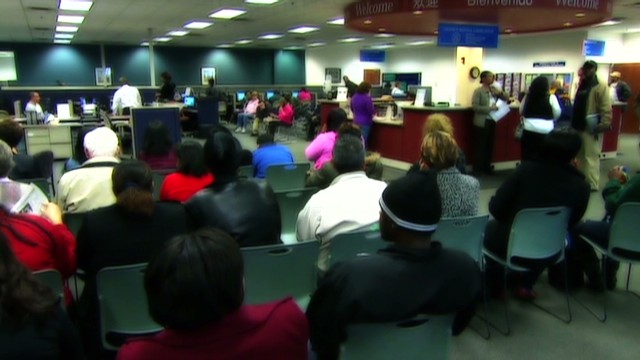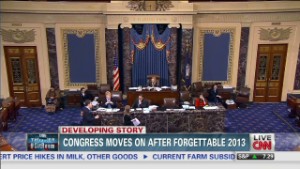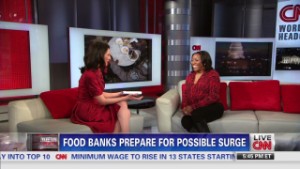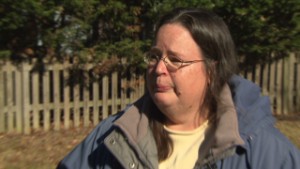New year, same old fight over jobless benefits

Extended unemployment benefits expire
- Congress will kick off new year with fight over extending jobless benefits
- 1.3 million people lost those benefits when Congress failed to act
- Partisan, midterm election year politics will further complicate the debate
(CNN) -- Congress will start the new year with an old fight: whether to extend jobless benefits for 1.3 million long-term unemployed.
They expired last week when lawmakers failed to continue a 2008 recession-era federal law providing nearly a year of benefits, paid for by U.S. taxpayers, that kicked in when state jobless benefits ran out.
Democrats argue the program is needed to sustain economic recovery and offer a lifeline to those struggling to keep their head above water financially.
 <cite class="expCaption">Congress moves on after forgettable 2013</cite>
<cite class="expCaption">Congress moves on after forgettable 2013</cite> <cite class="expCaption">Foodbanks Prepare for Unemployed</cite>
<cite class="expCaption">Foodbanks Prepare for Unemployed</cite> <cite class="expCaption">Losing unemployment benefits?</cite>
<cite class="expCaption">Losing unemployment benefits?</cite>Republicans counter the benefits are an economic drain and a disincentive to looking for work. The Congressional Budget Office estimates continuing them for another year will cost about $26 billion.
Senate Majority Leader Harry Reid, D-Nevada, plans on holding the first vote toward renewing them on Monday, the day the Senate returns from its holiday recess. It will be a procedural test of a proposal to stretch the program another three months.
Hillary Clinton encourages extending benefits for jobless
Democrats do not yet know if they have enough Republican support to get the 60 votes necessary to clear the procedural hurdle, a senior leadership aide told CNN.
The fight has played out repeatedly over the past few years as the two parties clashed in often dramatic showdowns rife with fiery rhetoric and lengthy filibusters.
But any legislative fights now will take place in a midterm election year. Democrats are refocusing on issues relating to economic inequality, which is important to their base.
The No. 2 Democrat in the House, Rep. Steny Hoyer, called Republican opposition to extending long-term unemployment benefits "reckless."
The Maryland lawmaker told reporters in a conference call on Friday that the issue isn't just about the economy.
"It's about real people struggling to put food on the table, to make ends meet," he said.
As unemployment benefits expire, Democrats vow to fight on
Some economists, such as Harvard's Lawrence Katz, say failing to act will have long-term consequences as those affected are forced to rely on other government programs for assistance and are unable to purchase goods and services.
He points to states like North Carolina where a law cutting state benefits was passed last summer, which then meant residents were no longer eligible to receive supplemental federal benefits.
While over roughly the next six months the state's unemployment rate dropped from 8.8% to 7.4%, such results were partly because of "declining labor force participation," Katz said. "It's very worrisome."
North Carolina economist Aaron Chatterji, at Duke University's Fuqua School of Business, said North Carolina foreshadows what could happen nationally.
"If Congress does not renew ... then up to 1.3 million Americans will be in the same boat as the North Carolinians affected by the changes in July," Chatterji said.
The U.S. unemployment rate stood at 7 percent in November, the most recent Labor Department statistics show. That means more than 10 million people were out of work, a third of them without a job for at least 27 weeks.
But other economists, such as James Sherk, a senior policy analyst in labor economics at the conservative Heritage Foundation, disagree.
"The models that conclude (unemployment insurance) boosts the economy are the same models that inaccurately predicted the stimulus would work," Sherk said of hundreds of billions in taxpayer dollars pumped into the economy post-recession to stimulate growth.
"They vastly overestimate the economic benefits of government spending. Studies from European nations—which have had extended benefits far longer than America has—find that longer benefits raise unemployment, while unemployment falls when benefits get reduced."
Many Republicans, including potential 2016 presidential candidate Sen. Rand Paul, R-Kentucky, have long insisted that the Great Recession-era extension of emergency federal benefits deter job hunting and are unnecessary as the economy rebounds and unemployment declines.
"When you allow people to be on unemployment insurance for 99 weeks, you're causing them to become part of this perpetual unemployed group in our economy," Paul said on Fox News last month. "And it really -- while it seems good, it actually does a disservice to the people you're trying to help."
CNNMoney: Job search: One year and counting
CNN's Lisa Desjardins contributed to this report.
